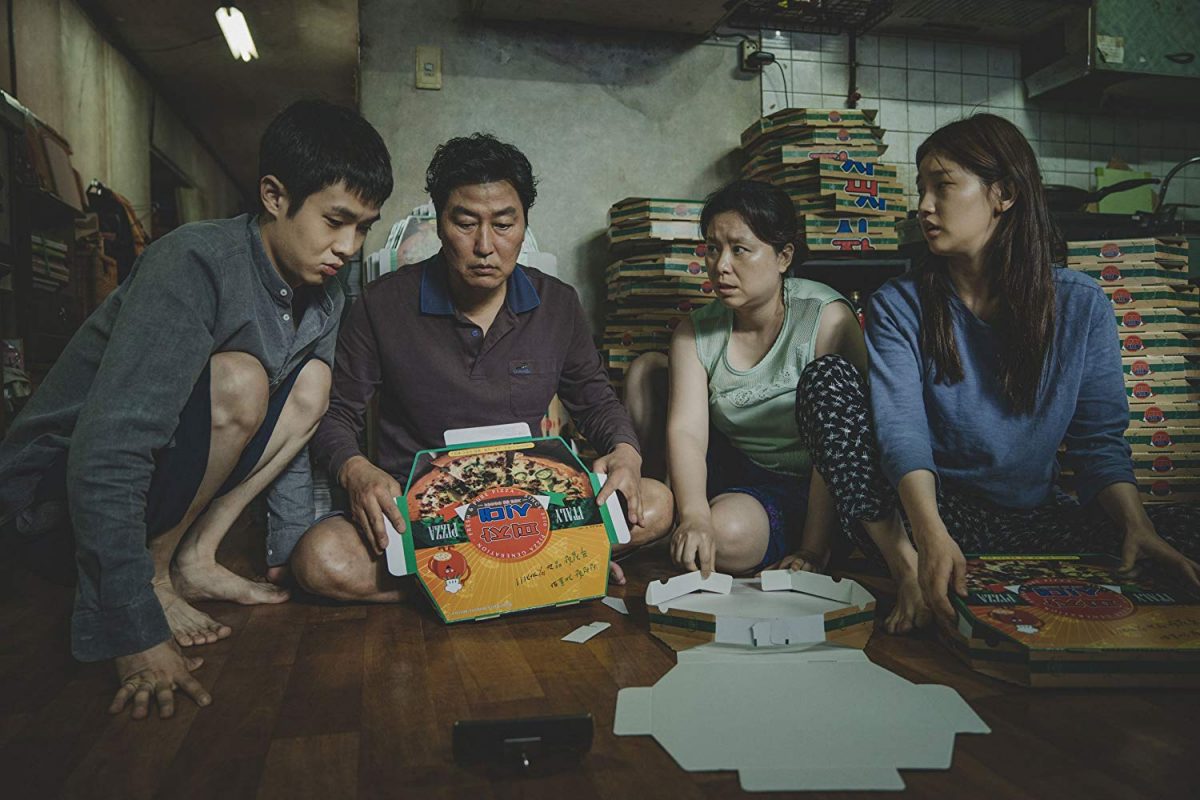After its Palme d’Or winning debut at Cannes earlier this year, Bong Joon-ho’s “Parasite” had its Canadian premiere this past week at the Toronto International Film Festival (TIFF). This is Bong’s first film completely in Korean since 2009’s “Mother” and it finds him in typical darkly comedic form, with emphasis on the “dark.”
“Parasite”, throughout its two-hour running time, is complex, tough, provocative and unnerving and uses its South Korean setting to tell a harrowing tale of the state of the neoliberal world. Everyone depends on someone else to some extent, but in “Parasite” dependency turns into something perverse and overwhelming as Bong interrogates the audience. What would you do survive?
The answer for the Kim family is anything. The quartet – mother, father, son, daughter – live in a decrepit basement-shanty of an apartment, struggling to make ends meet, depending on free Wi-Fi from surrounding areas but generally doing what they can to live. A chance proposition from a friend puts them on a collision course with the affluent Park family. Little by little each of the Kim quartet is able to finagle their way into the homes of the Park family, using their wiles to lands jobs that match their skills, if not their honesty. But things begin to go awry soon, and a seemingly off-kilter romp of an upstairs-downstairs riff turns into a sobering and horrifying indictment of contemporary culture and trickle-down economics.

Bong is working at peak levels of absurdism in the best of ways. “Parasite” inveigles its way into our consciousness. We laugh, at first, at its odd skewing of reality and the sheer temerity of its main characters. But laugher soon gives way to fright and then to despair. The absurdism is in the classic style of ‘what is the point of the world’, achieved too eerily well in a scene where a character continuously bangs his head against the wall to achieve a kind of spiritual breakthrough. It’s grotesque and it’s absurd. And, what Bong gets is that absurdism, when hewing close to its roots, is terribly similar to horror. For what is more horrifying than a world without meaning?
And, the camera in “Parasite” moves as if it is in a horror film. Even before the third act revelation that reveals a plot twist of horrific proportions, the camera seems to be looking at the lives of these characters through a lens that can only be described as perverse. It’s the kind of sustained tension that, at first, cannot help but be realised in breathless, nervous laughter but overtime Bong uses that breathless laughter against us, indicting us for the way that we become complicit not just in the secrets hidden away within the film’s labyrinth, but in the many indignities by way of comedy that the characters endured. A late-film flood, unleashes an emotional centre that the film has slyly been averting from until it bursts out, unencumbered and overwhelming. The editing during and immediately after the sequence, juxtaposing the lives of those who have against those who have not, is exquisitely detailed shots and a reminder of our own socio-political rot.
Real parasites are not accidental. They live off specific host bodies aware of which ones will provide them with the sustenance needed to continue. It’s that same deliberateness and symmetry that marks “Parasite”, a film that’s aesthetically and thematically suffused with decisive and deliberate adherence to rules and structures. The first and final shots of the film are in conversation with each other, emphasising the ways that the things occurring are not quite random but are instead borne out of levels and levels of destiny and fate. The film goes on for a bit too long. An epilogue works just a bit too hard at spelling out its theme in a way that feels somewhat at odds with the more chaotic bacchanal that’s come before. But it’s hard to complain, “Parasite” is technically proficient, so much that a savvy cut moving from a scene to another elicits a gasp just by the way the camera forces unlikely juxtapositions. The reveal of a particular unexpected plot point in halfway through the film is alarming and arresting and is dependent on the heady and dizzying camerawork as much as the narrative progression itself.
Poverty does not become the subject of mainstream cinema too often. Real incisive assessments of poverty, without romanticism or disingenuousness are rare, making them all the more welcome and necessary when they arrive. And poverty, like parasites and like “Parasite” is not accidental but specific and deliberate. It doesn’t just happen. Capitalistic structures depend on it. These characters are trapped in the symmetry of the world they live in – they can’t get out. One of the characters talks about a room in the house, dozens of houses have them. The point is larger. These inequalities are legion. Everywhere. And in that way the story’s freshness belies the banal normalcy of the themes it exposes. These parasites are everywhere and by the time Bong has summed up his thesis we feel guilty because we knew all along. But what can we do to change it? What would we do to change it? We’re all living off the system. Like parasites.




